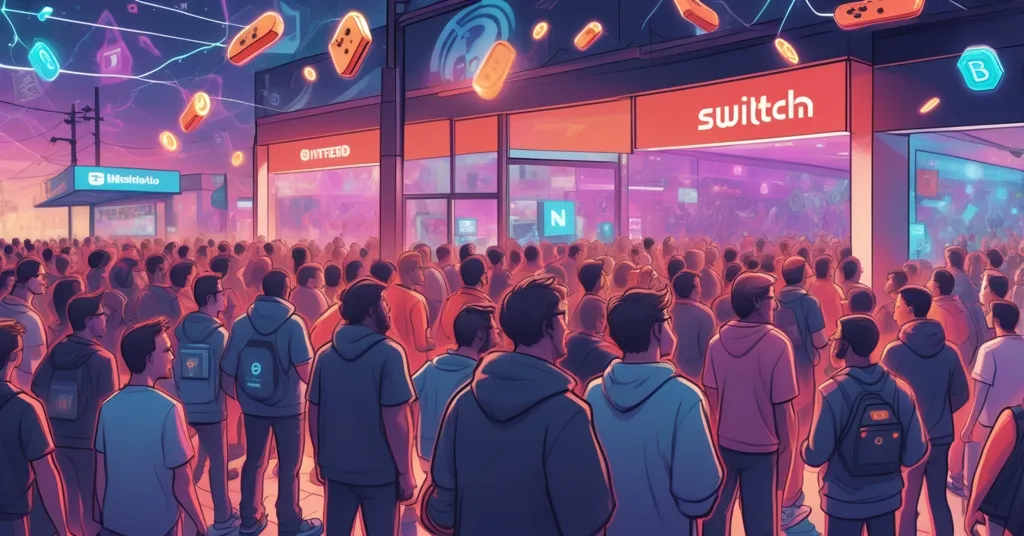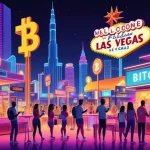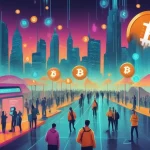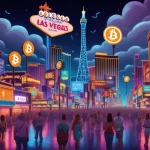Nintendo Switch 2 Launch Chaos: Could Blockchain and Bitcoin Revolutionize Gaming?

Nintendo Switch 2 Launch: A Gaming Tsunami with Blockchain on the Horizon
The Nintendo Switch 2 stormed onto the global scene on June 5, 2025, triggering a buying frenzy that sold out stock in mere minutes across major markets like New York and Tokyo. Fans camped out for up to 20 hours, while Japan grappled with 2.2 million lottery applicants, marking a launch so wild it’s been called “positively chaotic.” But beyond the gaming hype, there’s a bigger question for us at Let’s Talk, Bitcoin: could this cultural juggernaut open doors for blockchain and cryptocurrency to revolutionize how we play?
- Launch Madness: Sold out instantly worldwide, with massive lines and lotteries managing demand.
- Tech Upgrades: Bigger screen, better graphics, and backward compatibility fuel the hype.
- Crypto Potential: Blockchain ownership and Bitcoin payments could disrupt gaming norms.
Launch Day Chaos: A Global Uproar
Picture this: New York City, 4:30 a.m., and hundreds of gamers are already lined up outside GameStop’s Union Square hub and the Nintendo Store, shivering through a 20-hour wait just for a shot at the Switch 2. Across the Pacific in Tokyo’s Ikebukuro district, retailer Bic Camera had to implement a lottery system to handle a staggering 2.2 million applicants desperate for the console. Only a lucky few walked away with their prize on launch day, leaving the rest to curse their luck or turn to scalpers. Serkan Toto of Kantan Games didn’t sugarcoat the situation, warning that we’re looking at weeks—possibly months—of supply shortages before anyone can casually pick up a unit off the shelf. Nintendo’s betting on 15 million units sold this financial year, but with pre-orders at Target vanishing in under two hours, that number might be laughably conservative or a pipe dream, depending on how you see it.
“I feel like I’m going to cry,” admitted Yumi Ohi, a 30-year-old delivery contractor from Saitama Prefecture, overwhelmed with relief after securing a Switch 2 through Japan’s lottery system after multiple failed attempts.
“The level of demand seems to be sky-high. You are looking at weeks or months until you can walk into a store and buy a Switch 2,” stated Serkan Toto, Founder of Kantan Games, underscoring the scale of the supply crunch.
This isn’t just a launch; it’s a cultural earthquake. The original Switch moved over 152 million units since 2017, propelled by iconic titles like “The Legend of Zelda” and “Animal Crossing: New Horizons,” especially during the pandemic when gaming became a lifeline for many. The Switch 2 has tapped into that legacy, and the pent-up anticipation for a hardware refresh after years of speculation has unleashed a tidal wave of demand that’s testing Nintendo’s mettle.
What’s Under the Hood of Switch 2?
So, what’s driving fans to camp out in the cold or gamble on lotteries? The Switch 2 keeps the hybrid home-portable design that made its predecessor a hit but cranks up the specs. It boasts a larger screen for immersive play, improved graphics capable of running heavy hitters like “Cyberpunk 2077” at a smooth 60 frames per second, and faster processing power to eliminate frustrating lag. The new magnetic Joy-Con 2 controllers offer mouse-like functionality for precision, and integration with Nintendo Switch Online means access to classic games and social sharing features. Plus, full backward compatibility ensures your existing Switch library isn’t gathering dust. For gamers, this is the upgrade they’ve been drooling over.
But it’s not all roses. Priced at $499.99, the console isn’t exactly budget-friendly, and the launch title “Mario Kart World” retails for a steep $79.99 in the U.S., drawing flak from some who feel Nintendo’s milking their loyalty. Yet, not everyone’s griping. Akitomo Takahashi, a salesman in his forties, shrugs off the cost, pointing out that games during the Super Nintendo era weren’t cheap either. Nostalgia might soften the blow for veterans, but for younger players or those on tight budgets, dropping nearly $600 for a console and one game feels like a gut punch.
“I’ve been around since the Super Nintendo era. Games from that period were expensive too, so I think it’s somewhat within the acceptable range,” argued Akitomo Takahashi, offering a historical perspective on pricing.
“Line of people waiting to get Switch 2 but people online say nobody cares about Switch 2 and how it’s gonna flop,” tweeted Zelda fan LilAl85855 on X, exposing the gap between online trolls and real-world passion.
Nintendo’s Battle Beyond the Shelves
Nintendo isn’t just wrestling with rabid fans; they’re up against a geopolitical mess. The U.S.-China trade wars, kicked off under Donald Trump’s policies, have cast a long shadow over tech manufacturing. With much of the hardware production tied to Chinese facilities, potential tariffs, delays, or cost spikes could hamstring Nintendo’s ability to restock fast enough to meet demand. Analyst Piers Harding-Rolls of Ampere Analysis suggests the company is better prepared this time compared to past launches, but he’s quick to caution that the first-party game lineup at launch isn’t as robust as it could be. Without a killer app to hook casual players beyond the hardcore fanbase, long-term adoption might stumble. Still, he’s bullish, projecting over 100 million units sold by 2030 if momentum holds.
Then there’s the scalping nightmare. With units scarce, resellers are already jacking up prices on secondary markets, a problem that echoes past console launches like the PlayStation 5. It’s a raw deal for genuine fans, and it’s a dynamic that feels eerily familiar to anyone who’s watched crypto markets get gamed by whales and pump-and-dump schemes. Scarcity breeds FOMO, and FOMO breeds bad decisions—whether it’s overpaying for a console or falling for a dodgy altcoin shill.
Blockchain and Crypto: Could Nintendo Play a New Game?
Now, let’s zoom in on why this matters to our Bitcoin and blockchain enthusiasts. Gaming and decentralized tech have been dancing around each other for years, and with the Switch 2’s massive user base—building on 152 million original Switch owners—plus its online ecosystem via Nintendo Switch Online, we’ve got a potential sandbox for disruption. Imagine true digital ownership of games or in-game assets using blockchain technology. For the uninitiated, blockchain is a decentralized ledger that records transactions securely, often used in crypto like Bitcoin. Applied to gaming, it could mean owning your copy of “Mario Kart World” as a unique digital item, verifiable and tradable via something like NFTs (non-fungible tokens), which are one-of-a-kind digital certificates of ownership on a blockchain.
Picture a gamer snagging a rare in-game kart skin or character, minting it as an NFT, and selling it to another player for real-world value on a decentralized marketplace. Projects like Axie Infinity on Ethereum have already proven the model with play-to-earn mechanics, where users earn tokens for gameplay, raking in millions at their peak. Nintendo could tap into this blockchain gaming potential, letting players trade digital collectibles or even “used” game copies securely, breaking the closed systems where companies like Nintendo control every transaction. It’s not just ownership; it’s freedom—aligning with Bitcoin’s ethos of cutting out middlemen and empowering users.
Payments are another frontier. Why not let fans buy the Switch 2 or games directly with Bitcoin or stablecoins (cryptocurrencies pegged to assets like the U.S. dollar to avoid wild price swings)? With a global market, currency volatility in some regions, and rampant scalping, crypto payments could streamline transactions, reduce fraud, and sidestep regional pricing gouges. Imagine bypassing a scalper’s $1,000 markup by paying Nintendo directly in Bitcoin via the Lightning Network, a layer on Bitcoin for fast, cheap microtransactions. It’s censorship-resistant, borderless, and could position Nintendo as a pioneer in mainstream crypto adoption.
Even supply chain woes could see blockchain solutions. Decentralized tracking on a public ledger could offer transparency for manufacturing and distribution, potentially mitigating delays tied to trade tensions. And for scalping? A crypto-based ticketing or purchase system might lock units to verified buyers, though it’s a long shot given the tech’s complexity for mass adoption.
The Flip Side: Why Nintendo Might Balk
Let’s pump the brakes before we mine for Switch 2 stock like it’s Bitcoin in 2010. There’s no hard evidence Nintendo’s eyeing blockchain or crypto payments. Gaming giants have historically been cagey about decentralized tech, and for good reason. Look at Ubisoft’s NFT push a few years back—met with fierce gamer backlash over perceived cash grabs and environmental concerns tied to blockchain’s energy use (though newer protocols like Ethereum’s post-merge are far greener). Nintendo, with its family-friendly brand, might not want to risk associating with a space still plagued by scams, rug pulls, and regulatory gray zones. Remember those fake crypto giveaways on X promising free Bitcoin? Slap a Switch 2 label on that, and you’ve got a PR disaster waiting to happen.
There’s also the adoption hurdle. Crypto wallets and blockchain interfaces aren’t exactly user-friendly for the average Mario fan. Forcing grandma to set up a MetaMask to buy little Timmy’s Christmas gift is a non-starter. And while scarcity mirrors crypto market FOMO—like Bitcoin halving hype or altcoin pumps—we’ve got to call out the lack of concrete restock data. Hyping the shortage without numbers is no better than those sketchy “Bitcoin to $1M” predictions we regularly shred. Plus, if the launch game lineup flops with casuals as Harding-Rolls warns, even blockchain innovations in gaming won’t save sluggish sales.
Parallels to Crypto Dynamics: FOMO and Freedom
The Switch 2 mania isn’t just a gaming story; it’s a masterclass in scarcity-driven hype that any crypto OG will recognize. Limited supply and rabid demand? That’s Bitcoin post-halving or a hot new token launch in a nutshell. Scalpers flipping units for triple the price? Smells like market manipulation by crypto whales. But here’s the rub: while FOMO can drive adoption, it can also burn trust if players—or investors—feel screwed over. Nintendo’s challenge is to balance accessibility with this chaos, much like Bitcoin’s struggle to scale without losing its decentralized soul.
Yet, the real parallel is freedom. If Nintendo ever embraced blockchain for ownership or Bitcoin for payments, it could hand gamers the kind of autonomy we champion in the crypto space—control over assets, bypassing gatekeepers, and sticking it to overpriced systems. It’s a long shot, but with 152 million potential users, even a small step toward decentralization could drag crypto into every living room. Could this be the crossover that makes Bitcoin less of a niche and more of a household name?
Key Questions and Takeaways
- What sparked the Nintendo Switch 2 launch frenzy?
Massive demand stems from the original Switch’s 152 million-unit legacy, years of anticipation for a refresh, and standout upgrades like superior graphics and a larger screen, drawing in both hardcore fans and nostalgics. - How severe are the Switch 2 supply shortages?
Analysts predict weeks or months of shortages, with 2.2 million lottery applicants in Japan and instant sell-outs globally, compounded by trade war logistics—a scarcity dynamic reminiscent of Bitcoin’s limited supply. - Could blockchain transform Nintendo’s gaming ecosystem?
Blockchain could enable true ownership of digital games or assets as NFTs, allowing players to trade or monetize items securely via platforms tied to Nintendo Switch Online, disrupting traditional control by publishers. - Are cryptocurrency payments feasible for Nintendo?
Bitcoin or stablecoins could ease global purchases and combat scalping fraud, but volatility, regulatory hurdles, and user complexity make it a tough sell for a mainstream brand like Nintendo. - What risks come with Nintendo exploring decentralization?
Beyond tech adoption barriers, there’s brand risk from crypto scams or gamer backlash, as seen in past NFT flops, plus environmental concerns—issues we’ve long critiqued in the blockchain space. - Should we expect Nintendo to pioneer crypto in gaming?
It’s speculative without official moves, but their user base and online features make it a tempting arena for decentralization experiments, aligning with our push for freedom and disruption over status quo systems.



